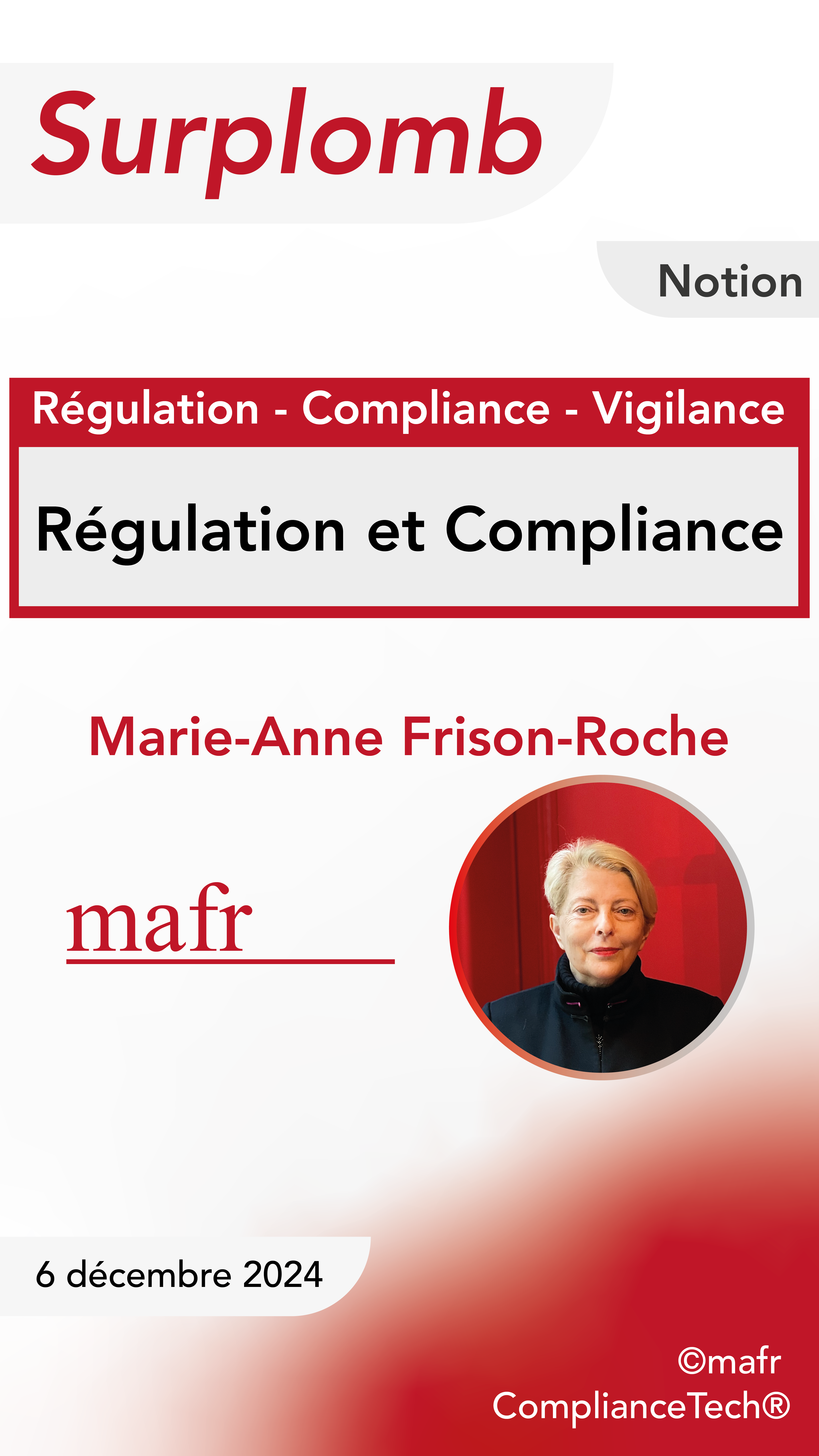Publications : Doctrine
► Référence complète : Houtcieff, D., Les plateformes au défi des plateformes, in L'émergence d'un droit des plateformes, Dalloz, coll. « Thèmes et commentaires », 2021, pp.51-64.
_____
► Lire la présentation générale de l'ouvrage dans lequel s'insère cet article.
Thesaurus : Doctrine
► Référence complète : Fr. Berrod, "Introduction au DMA : un esprit pionnier de la régulation des plateformes numériques", Dalloz IP/IT, 2023, pp. 266-271
____
► Résumé de l'article (fait par l'auteur) : "Le Digital Markets Act (DMA) a été proposé en même temps que son jumeau le Digital Service Act et ils ont été négociés en parallèle et stabilisés par la présidence française de l'Union européenne. Il est applicable à partir du 2 mai 2023. Sa négociation fut menée de façon remarquablement rapide (moins de seize mois pour obtenir l'accord politique sur la proposition de la Commission du 15 déc. 2020), si l'on rappelle la difficulté de ces deux textes, tant technique que juridique. Le DMA vient modifier les directives (UE) 2019/1937 et (UE) 2020/1828. Le titre technique choisi reflète l'ambition de ce texte, consacré « aux marchés contestables et équitables dans le secteur numérique ». Nous retracerons dans cette contribution les principaux éléments de compréhension du DMA.".
____
🦉Cet article est accessible en texte intégral pour les personnes inscrites aux enseignements de la Professeure Marie-Anne Frison-Roche
________
Publications : Doctrine
► Référence complète : Roda, J.-Ch, Vers un droit de la concurrence des plateformes , in L'émergence d'un droit des plateformes, Dalloz, coll. « Thèmes et commentaires », 2021, pp.77-90.
_____
► Lire la présentation générale de l'ouvrage dans lequel s'insère cet article.
Thesaurus : Doctrine

► Full Reference: R. Sève, "L'Obligation de Compliance et les mutations de la souveraineté et de la citoyenneté" ("Compliance Obligation and changes in Sovereignty and Citizenship"), in M.-A. Frison-Roche (ed.), L'obligation de Compliance, Journal of Regulation & Compliance (JoRC) and Dalloz, coll. "Régulations & Compliance", 2024, forthcoming.
____
📕read the general presentation of the book, L'obligation de Compliance, in which this article is published.
____
► English Summary of this article (done by the Journal of Regulation & Compliance - JoRC) : The contribution describes "les changements de philosophie du droit que la notion de compliance peut impliquer par rapport à la représentation moderne de l’Etat assurant l’effectivité des lois issues de la volonté générale, dans le respect des libertés fondamentales qui constituent l’essence du sujet de droit." ("the changes in legal philosophy that the notion of Compliance may imply in relation to the modern representation of the State ensuring the effectiveness of laws resulting from the general will, while respecting the fundamental freedoms that constitute the essence of the subject of law").
The contributor believes that the definition of Compliance is due to authors who « jouer un rôle d’éclairage et de structuration d’un vaste ensemble d’idées et de phénomènes précédemment envisagés de manière disjointe. Pour ce qui nous occupe, c’est sûrement le cas de la théorie de la compliance, développée en France par Marie-Anne Frison-Roche dans la lignée de grands économistes (Jean-Jacques Laffont, Jean Tirole) et dont la première forme résidait dans les travaux bien connus de la Professeure sur le droit de la régulation. » ( "play a role in illuminating and structuring a vast set of ideas and phenomena previously considered in a disjointed manner. For our purposes, this is certainly the case with the theory of Compliance, developed in France by Marie-Anne Frison-Roche in the tradition of great economists (Jean-Jacques Laffont, Jean Tirole) and whose first form was in her well-known work on Regulatory Law").
Drawing on the Principles of the Law of the American Law Institute, which considers compliance to be a "set of rules, principles, controls, authorities, offices and practices designed to ensure that an organisation conforms to external and internal norms", he stresses that Compliance thus appears to be a neutral mechanism aimed at efficiency through a move towards Ex Ante. But he stresses that the novelty lies in the fact that it is aimed 'only' at future events, by 'refounding' and 'monumentalising' the matter through the notion of 'monumental goals' conceived by Marie-Anne Frison-Roche, giving rise to a new jus comune. Thus, "la compliance c’est l’idée permanente du droit appliquée à de nouveaux contextes et défis." ("Compliance is the permanent idea of Law applied to new contexts and challenges").
So it's not a question of making budget savings, but rather of continuing to apply the philosophy of the Social Contract to complex issues, particularly environmental issues.
This renews the place occupied by the Citizen, who appears not only as an individual, as in the classical Greek concept and that of Rousseau, but also through entities such as NGOs, while large companies, because they alone have the means to pursue the Compliance Monumental Goals, would be like "super-citizens", something that the digital space is beginning to experience, at the risk of the individuals themselves disappearing as a result of "surveillance capitalism". But in the same way that thinking about the Social Contract is linked to thinking about capitalism, Compliance is part of a logical historical extension, without any fundamental break: "C’est le développement et la complexité du capitalisme qui forcent à introduire dans les entités privées des mécanismes procéduraux d’essence bureaucratique, pour discipliner les salariés, contenir les critiques internes et externes, soutenir les managers en place" ("It is the development and complexity of capitalism that forces us to introduce procedural mechanisms of a bureaucratic nature into private entities, in order to discipline employees, contain internal and external criticism, and support the managers in place") by forcing them to justify remuneration, benefits, and so on.
Furthermore, in the words of the author, "Avec les buts monumentaux, - la prise en compte des effets lointains, diffus, agrégés par delà les frontières, de l’intérêt des générations futures, de tous les êtres vivants - , on passe, pour ainsi dire, à une dimension industrielle de l’éthique, que seuls de vastes systèmes de traitement de l’information permettent d’envisager effectivement." ("With the Monumental Goals - taking into account the distant, diffuse effects, aggregated across borders, the interests of future generations, of all living beings - we move, so to speak, to an industrial dimension of ethics, which only vast information processing systems can effectively envisage").
This is how we can find a division between artificial intelligence and human beings in organisations, particularly companies, or in decision-making processes.
In the same way, individual freedom does not disappear with Compliance, because it is precisely one of its monumental goals to enable individuals to make choices in a complex environment, particularly in the digital space where the democratic system is now at stake, while technical mechanisms such as early warning will revive the right to civil disobedience, invalidating the complaint of "surveillance capitalism".
The author concludes that the stakes are so high that Compliance, which has already overcome the distinctions between Private and Public Law and between national and international law, must also overcome the distinction between Information and secrecy, particularly in view of cyber-risks, which requires the State to develop and implement non-public Compliance strategies to safeguard the future.
________
Publications : Doctrine
► Référence complète : Amrani-Mekki, S., Les plateformes de résolution en ligne des différends, in L'émergence d'un droit des plateformes, Dalloz, coll. « Thèmes et commentaires », 2021, pp.189-203.
_____
► Lire la présentation générale de l'ouvrage dans lequel s'insère cet article.
Thesaurus : Doctrine

► Full Reference : E. Netter, "Les technologies de conformité pour satisfaire les exigences du droit de la compliance. Exemple du numérique" (Conformity technologies to meet the requirements of Compliance Caw. Digital example), in M.-A. Frison-Roche (dir.), L'obligation de Compliance, Journal of Regulation & Compliance (JoRC) and Dalloz, coll. "Régulations & Compliance", 2024, forthcoming.
____
📕read the general presentation of the book, L'obligation de Compliance, in which this contribution is published.
____
► English summary of this contribution (done by the Journal of Regulation & Compliance) :The author distinguishes between Compliance, which refers to Monumental Goals, and conformity, which are the concrete means that the company uses to tend towards them, through processes, check-lists in the monitoring of which the operator is accountable (art. 5.2. GRPD). Technology enables the operator to meet this requirement, as the changing nature of technology fits in well with the very general nature of the goals pursued, which leave plenty of room for businesses and public authorities to produce soft law.
The contribution focuses firstly on existing technologies. Through Compliance, Law can prohibit a technology or restrict its use because it runs counter to the goal pursued, for example the technology of fully automated decisions producing legal effects on individuals. Because it is a perilous exercise to dictate by law what is good and what is bad in this area, the method is rather one of explicability, i.e. control through knowledge by others.
Regulators are nevertheless developing numerous requirements stemming from the Monumental Goals of Compliance. Operators must update their technology or abandon obsolete technology in the light of new risks or to enable effective competition that does not lock users into a closed system. But technological power must not become too intrusive, as the privacy and freedom of the individuals concerned must be respected, which leads to the principles of necessity and proportionality.
The author stresses that operators must comply with the regulations by using certain technologies if these technologies are available, or even to counteract them if they are contrary to the goals of the regulations, but this obligation of conformity is applied only if these technologies are available. The notion of "available technology" therefore becomes the criterion of the obligation, which means that its content varies with circumstances and time, particularly in the area of cybersecurity.
In the second part of this contribution, the author examines technologies that are only potential, those that Law, and in particular the courts, might require companies to invent in order to fulfill their conformity obligation. This is quite understandable when we are talking about technologies that are in the making, but which will come to fruition, for example in the area of personal data transfer to satisfy the right to portability (GRPD), or where companies must be encouraged to develop technologies that are of less immediate benefit to them, or in the area of secure payment to ensure strong authentication (SPD 2).
This is more difficult for technologies whose feasibility is not even certain, such as online age verification or the interoperability of secure messaging systems, two requirements which appear to be technologically contradictory in their terms, and which therefore still come under the heading of "imaginary technology". But Compliance is putting so much pressure on companies, particularly digital technology companies, that considerable investment is required to achieve it.
The author concludes that this is the very ambition of Compliance and that the future will show how successful it will be.
____
🦉This article is available in full texte for persons following Professor Marie-Anne Frison-Roche teaching.
________
Editorial responsibilities : Direction de la collection "Droit et Économie", L.G.D.J. - Lextenso éditions (30)
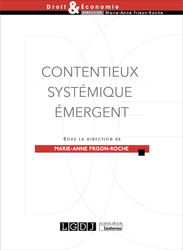
🌐follow Marie-Anne Frison-Roche on LinkedIn
🌐subscribe to the Newsletter MAFR. Regulation, Compliance, Law
____
► Full Reference: M.-A. Frison-Roche (ed.), Contentieux Systémique Émergent (Emerging Systemic Litigation), Paris, LGDJ, "Droit & Économie" Serie, to be published
____
📚Consult all the other books of the Serie in which this book is published
____
► General Presentation of the Book :
____
TABLE OF CONTENTS
Thesaurus : Doctrine

► Full Reference: R. Sève, "Compliance Obligation and changes in Sovereignty and Citizenship", in M.-A. Frison-Roche (ed.), Compliance Obligation, Journal of Regulation & Compliance (JoRC) and Bruylant, "Compliance & Regulation" Serie, to be published
____
📘read a general presentation of the book, Compliance Obligation, in which this article is published
____
► Summary of the article (done by the Journal of Regulation & Compliance - JoRC):
The contribution describes "les changements de philosophie du droit que la notion de compliance peut impliquer par rapport à la représentation moderne de l’Etat assurant l’effectivité des lois issues de la volonté générale, dans le respect des libertés fondamentales qui constituent l’essence du sujet de droit." ("the changes in legal philosophy that the notion of Compliance may imply in relation to the modern representation of the State ensuring the effectiveness of laws resulting from the general will, while respecting the fundamental freedoms that constitute the essence of the subject of law").
The contributor believes that the definition of Compliance is due to authors who « jouer un rôle d’éclairage et de structuration d’un vaste ensemble d’idées et de phénomènes précédemment envisagés de manière disjointe. Pour ce qui nous occupe, c’est sûrement le cas de la théorie de la compliance, développée en France par Marie-Anne Frison-Roche dans la lignée de grands économistes (Jean-Jacques Laffont, Jean Tirole) et dont la première forme résidait dans les travaux bien connus de la Professeure sur le droit de la régulation. » ( "play a role in illuminating and structuring a vast set of ideas and phenomena previously considered in a disjointed manner. For our purposes, this is certainly the case with the theory of Compliance, developed in France by Marie-Anne Frison-Roche in the tradition of great economists (Jean-Jacques Laffont, Jean Tirole) and whose first form was in her well-known work on Regulatory Law").
Drawing on the Principles of the Law of the American Law Institute, which considers compliance to be a "set of rules, principles, controls, authorities, offices and practices designed to ensure that an organisation conforms to external and internal norms", he stresses that Compliance thus appears to be a neutral mechanism aimed at efficiency through a move towards Ex Ante. But he stresses that the novelty lies in the fact that it is aimed 'only' at future events, by 'refounding' and 'monumentalising' the matter through the notion of 'monumental goals' conceived by Marie-Anne Frison-Roche, giving rise to a new jus comune. Thus, "la compliance c’est l’idée permanente du droit appliquée à de nouveaux contextes et défis." ("Compliance is the permanent idea of Law applied to new contexts and challenges").
So it's not a question of making budget savings, but rather of continuing to apply the philosophy of the Social Contract to complex issues, particularly environmental issues.
This renews the place occupied by the Citizen, who appears not only as an individual, as in the classical Greek concept and that of Rousseau, but also through entities such as NGOs, while large companies, because they alone have the means to pursue the Compliance Monumental Goals, would be like "super-citizens", something that the digital space is beginning to experience, at the risk of the individuals themselves disappearing as a result of "surveillance capitalism". But in the same way that thinking about the Social Contract is linked to thinking about capitalism, Compliance is part of a logical historical extension, without any fundamental break: "C’est le développement et la complexité du capitalisme qui forcent à introduire dans les entités privées des mécanismes procéduraux d’essence bureaucratique, pour discipliner les salariés, contenir les critiques internes et externes, soutenir les managers en place" ("It is the development and complexity of capitalism that forces us to introduce procedural mechanisms of a bureaucratic nature into private entities, in order to discipline employees, contain internal and external criticism, and support the managers in place") by forcing them to justify remuneration, benefits, and so on.
Furthermore, in the words of the author, "Avec les buts monumentaux, - la prise en compte des effets lointains, diffus, agrégés par delà les frontières, de l’intérêt des générations futures, de tous les êtres vivants - , on passe, pour ainsi dire, à une dimension industrielle de l’éthique, que seuls de vastes systèmes de traitement de l’information permettent d’envisager effectivement." ("With the Monumental Goals - taking into account the distant, diffuse effects, aggregated across borders, the interests of future generations, of all living beings - we move, so to speak, to an industrial dimension of ethics, which only vast information processing systems can effectively envisage").
This is how we can find a division between artificial intelligence and human beings in organisations, particularly companies, or in decision-making processes.
In the same way, individual freedom does not disappear with Compliance, because it is precisely one of its monumental goals to enable individuals to make choices in a complex environment, particularly in the digital space where the democratic system is now at stake, while technical mechanisms such as early warning will revive the right to civil disobedience, invalidating the complaint of "surveillance capitalism".
The author concludes that the stakes are so high that Compliance, which has already overcome the distinctions between Private and Public Law and between national and international law, must also overcome the distinction between Information and secrecy, particularly in view of cyber-risks, which requires the State to develop and implement non-public Compliance strategies to safeguard the future.
____
🦉This article is available in full text to those registered for Professor Marie-Anne Frison-Roche's courses
________
Thesaurus : Doctrine
► Référence complète : Th. Langlois-Berthelot, La blockchain au regard du droit et de l'identité, thèse de doctorat en Droit et sciences sociales, École des hautes études en sciences sociales (EHESS), 2023, 473 p.
____
________
May 29, 2026
Editorial responsibilities : Direction of the collection Compliance & Regulation, JoRC and Bruylant

🌐Follow Marie-Anne Frison-Roche on LinkedIn
🌐Subscribe to the Newsletter MAFR Regulation, Compliance, Law
🌐Subscribe to the video newsletter MAFR Overhang
🌐Subscribe to the Newsletter MaFR Law & Art
____
► Full Reference: M.-A. Frison-Roche (ed.), Compliance Obligation, Journal of Regulation & Compliance (JoRC) and Bruylant, "Compliance & Regulation" Serie, 2026, to be published
____
📕In parallel, a book in French L'Obligation de compliance, is published in the collection "Régulations & Compliance" co-published by the Journal of Regulation & Compliance (JoRC) and Lefebvre-Dalloz.
____
📚This book is inserted in this series created by Marie-Anne Frison-Roche for developing Compliance Law.
read the presentations of the other books of this Compliance Series:
- further books:
🕴️M.A. Frison-Roche (ed.), 📘Compliance Evidential System, 2027
🕴️M.A. Frison-Roche (ed.), 📘Compliance and Contract, 2027
- previous books:
🕴️M.A. Frison-Roche (ed), 📘Compliance Juridictionnalisation, 2023
🕴️M.A. Frison-Roche (ed), 📘Compliance Monumental Goals, 2022
🕴️M.-A. Frison-Roche (ed.), 📘Compliance Tools, 2021
____
► go to the general presentation of this 📚Series Compliance & Regulation, conceived, founded et managed by Marie-Anne Frison-Roche, co-published par the Journal of Regulation & Compliance (JoRC) and Bruylant.
____
🧮the book follows the cycle of colloquia organised by the Journal of Regulation & Compliance (JoRC) and its Universities partners.
____
► general presentation of the book: Compliance is sometimes presented as something that cannot be avoided, which is tantamount to seeing it as the legal obligation par excellence, Criminal Law being its most appropriate mode of expression. However, this is not so evident. Moreover, it is becoming difficult to find a unity to the set of compliance tools, encompassing what refers to a moral representation of the world, or even to the cultures specific to each company, Compliance Law only having to produce incentives or translate this ethical movement. The obligation of compliance is therefore difficult to define.
This difficulty to define affecting the obligation of compliance reflects the uncertainty that still affects Compliance Law in which this obligation develops. Indeed, if we were to limit this branch of law to the obligation to "be conform" with the applicable regulations, the obligation would then be located more in these "regulations", the classical branches of Law which are Contract Law and Tort Law organising "Obligations" paradoxically remaining distant from it. In practice, however, it is on the one hand Liability actions that give life to legal requirements, while companies make themselves responsible through commitments, often unilateral, while contracts multiply, the articulation between legal requirements and corporate and contractual organisations ultimately creating a new way of "governing" not only companies but also what is external to them, so that the Monumental Goals, that Compliance Law substantially aims at, are achieved.
The various Compliance Tools illustrate this spectrum of the Compliance Obligation which varies in its intensity and takes many forms, either as an extension of the classic legal instruments, as in the field of information, or in a more novel way through specific instruments, such as whistleblowing or vigilance. The contract, in that it is by nature an Ex-Ante instrument and not very constrained by borders, can then appear as a natural instrument in the compliance system, as is the Judge who is the guarantor of the proper execution of Contract and Tort laws. The relationship between companies, stakeholders and political authorities is thus renewed.
____
🏗️general construction of the book
The book opens with a substantial Introduction, putting the different sort of obligations of compliance in legal categories for showing that companies must build structures of compliance (obligation of result) and act to contribute with states and stakeholders to reach Monumental Goals (obligation of means).
The first part is devoted to the definition of the Compliance Obligation.
The second part presents the articulation of Compliance obligation with the other branchs of Law, because the specific obligation is built by Compliance Law, as new substantial branch of Law but also by many other branchs of Law.
The third part develops the pratical means established to obtained the Compliance Obligation to be effective, efficace and efficient.
The fourth part takes the Obligation of Vigilance as an illustration of all these considerations and the discussion about the future of this sparehead fo the Compliance Obligation .
The fifth part refers to the place and the role of the judges, natural characters for any obligation.
____
TABLE OF CONTENTS
ANCHORING THE SO DIVERSE COMPLIANCE OBLIGATIONS IN THEIR NATURE, REGIMES AND FORCE TO BRING OUT THE VERY UNITY OF THE COMPLIANCE OBLIGATION, MAKING IT COMPREHENSIBLE AND PRACTICABLE
🔹 Compliance Obligation: building a compliance structure that produces credible results withe regard to the Monumentals Goals targeted by the Legislator, by 🕴️Marie-Anne Frison-Roche
TITLE I.
IDENTIFYING THE COMPLIANCE OBLIGATION
CHAPTER I: NATURE OF THE COMPLIANCE OBLIGATION
Section 1 🔹 Will, Heart and Calculation, the three marks surrounding the Compliance Obligation, by 🕴️Marie-Anne Frison-Roche
Section 2 🔹 Debt, as the basis of the compliance obligation, by 🕴️Bruno Deffains
Section 3 🔹 Compliance Obligation and Human Rights, by 🕴️Jean-Baptiste Racine
Section 4 🔹 Compliance Obligation and changes in Sovereignty and Citizenship, by 🕴️René Sève
Section 5 🔹 The definition of the Compliance Obligation in Cybersecurity, by 🕴️Michel Séjean
CHAPTER II: SPACES OF THE COMPLIANCE OBLIGATION
Section 1 🔹 Industrial Entities and Compliance Obligation, by 🕴️Etienne Maclouf
Section 2 🔹 Compliance, Value Chains and Service Economy, by 🕴️Lucien Rapp
Section 3 🔹 Compliance and conflict of laws. International Law of Vigilance-Conformity, based on applications in Europe, by 🕴️Louis d'Avout
TITLE II.
ARTICULATING THE COMPLIANCE OBLIGATION WITH OTHER BRANCHES OF LAW
Section 1 🔹 Tax Law and Compliance Obligation, by 🕴️Daniel Gutmann
Section 2 🔹 General Procedural Law, prototype of the Compliance Obligation, by 🕴️Marie-Anne Frison-Roche
Section 3 🔹 Corporate and Financial Markets Law facing the Compliance Obligation, by 🕴️Anne-Valérie Le Fur
Section 4 🔹 Transformation of Governance and Vigilance Obligation, by 🕴️Véronique Magnier
Section 5 🔹 The Relation between Tort Law and Compliance Obligation, by 🕴️Jean-Sébastien Borghetti
Section 6 🔹 Environmental and Climate Compliance, by 🕴️Marta Torre-Schaub
Section 7 🔹 Competition Law and Compliance Law, by 🕴️Jean-Christophe Roda
Section 8 🔹 The Compliance Obligation in Global Law, by 🕴️Benoît Frydman & 🕴️Alice Briegleb
Section 9 🔹 Environmental an Climatic Dimensions of the Compliance Obligation, by 🕴️Marta Torre-Schaub
Section 10 🔹 Judge of Insolvency Law and Compliance Obligations, by 🕴️Jean-Baptiste Barbièri
TITLE III.
COMPLIANCE: GIVE AND TAKE THE MEANS TO OBLIGE
CHAPTER I: COMPLIANCE OBLIGATION: THE CONVERGENCE OF SOURCES
Section 1 🔹 Compliance Obligation upon Obligation works, by 🕴️Marie-Anne Frison-Roche
Section 2 🔹 Conformity technologies to meet Compliance Law requirements. Some examples in Digital Law, by 🕴️Emmanuel Netter
Section 3 🔹 Legal Constraint and Company Strategies in Compliance matters, by 🕴️Jean-Philippe Denis & 🕴️Nathalie Fabbe-Coste
Section 4 🔹 Opposition and convergence of American and European legal systems in Compliance Rules and Systems, by 🕴️Raphaël Gauvain & 🕴️Blanche Balian
Section 5 🔹 In Compliance Law, the legal consequences for Entreprises of their Commitments and Undertakings, by 🕴️Marie-Anne Frison-Roche
CHAPTER II: INTERNATIONAL ARBITRATION IN SUPPORT OF THE COMPLIANCE OBLIGATION
Section 1 🔹 How International Arbitration can reinforce the Compliance Obligation, by 🕴️Laurent Aynès
Section 2 🔹 Arbitration consideration of Compliance Obligation for a Sustainable Arbitration Place, by 🕴️Marie-Anne Frison-Roche
Section 3 🔹 The Arbitral Tribunal's Award in Kind, in support of the Compliance Obligation, by 🕴️Eduardo Silva Romero
Section 4 🔹 The use of International Arbitration to reinforce the Compliance Obligation: the example of the construction sector, by 🕴️Christophe Lapp
Section 5 🔹 The Arbitrator, Judge, Supervisor, Support, by 🕴️Jean-Baptiste Racine
TITLE IV.
VIGILANCE, SPEARHEAD OF THE COMPLIANCE OBLIGATION
Section 1 🔹 Vigilance Obligation, Spearheard and Total Share of the Compliance Obligation, by 🕴️Marie-Anne Frison-Roche
CHAPTER I: INTENSITIES OF THE VIGILANCE OBLIGATION, SPEARHEAD OF THE COMPLIANCE SYSTEM
Section 2 🔹 Intensity of the Vigilance Obligation by Sectors: the case of Financial Operators, by 🕴️Anne-Claire Rouaud
Section 3 🔹 Intensity of the Vigilance Obligation by Sectors: the case of Digital Operators, by 🕴️Grégoire Loiseau
Section 4 🔹 Intensity of the Vigilance Obligation by Sectors: the case of Energy Operators, by 🕴️Marie Lamoureux
CHAPTER II: GENERAL EVOLUTION OF THE VIGILANCE OBLIGATION
Section 1 🔹 Rethinking the Concept of Civil Liability in the light of the Duty of Vigilance, Spearhead of Compliance, by 🕴️Mustapha Mekki
Section 2 🔹 Contracts and clauses, implementation and modalities of the Vigilance Obligation, by 🕴️Gilles J. Martin
Section 3 🔹 Proof that Vigilance has been properly carried out with regard to the Compliance Evidence System, by 🕴️Jean-Christophe Roda
Section 4 🔹 Compliance, Vigilance and Civil Liability: put in order and keep the Reason, by 🕴️Marie-Anne Frison-Roche
Title V.
THE JUDGE AND THE COMPLIANCE OBLIGATION
Section 1 🔹 Present and Future Challenges of Articulating Principles of Civil and Commercial Procedure with the Logic of Compliance, by 🕴️Thibault Goujon-Bethan
Section 2 🔹 The Judge required for an Effective Compliance Obligation, by 🕴️Marie-Anne Frison-Roche
________
CONCLUSION
THE COMPLIANCE OBLIGATION: A BURDEN BORNE BY SYSTEMIC COMPANIES GIVING LIFE TO COMPLIANCE LAW
(conclusion and key points of the books, free access)
Nov. 4, 2025
Thesaurus : Doctrine
► Référence complète : E. Hache, V. d'Herbemont, L.-M. Malbec et C. Roche, "Transition énergétique : une rupture dans la dynamique de demande mondiale en métaux ?", in Ch. Poinsso (dir.), Les métaux stratégiques, nouveau défi de la transition énergétique et de la réindustrialisation, Annales des Mines, coll. "Réalités industrielles", nov. 2025.
____
📗lire la présentation du numéro
____
► Résumé de cet article (faite par les auteurs) : "Les métaux stratégiques, nouveau défi de la transition énergétique et de la réindustrialisation En 2024, les investissements dans les technologies bas-carbone (énergies renouvelables, nucléaire, réseaux, stockage, efficacité énergétique, carburants peu émissifs et véhicules électriques) ont atteint près de 2 100 milliards de dollars, soit une hausse de 11 % par rapport à 2023 (BNEF, 2025). Si ces investissements représentent aujourd’hui quasiment le double de ceux observés dans le secteur des hydrocarbures, un objectif de limitation de la hausse des températures à 1,5°C à l’horizon 2050 nécessiterait une multiplication par 2,5 de ce niveau d’investissement annuel. Ce rythme d’investissement, bien qu’insuffisant au regard des enjeux climatiques, a ravivé l’intérêt pour la sécurisation des ressources minérales, mobilisées en grandes quantités par la transition énergétique. Ces ressources minérales constituent en effet la base des technologies bas-carbone. Elles sont ainsi essentielles pour les moteurs et batteries des véhicules électrifiés (cobalt, cuivre, lithium, nickel, terres rares, graphite), pour les divers composants des parcs éoliens (aluminium, cuivre, graphite, manganèse, molybdène, nickel, etc.), pour les panneaux solaires (argent, cuivre, indium, silicium, etc.) et pour les technologies de l’hydrogène (nickel, palladium, platine). La majeure partie de ces substances étant des métaux, on parle par abus de langage de métaux même si le lithium ou d’autres n’en sont pas. Le niveau de déploiement requis pour ces technologies à l’horizon 2050 pourrait entraîner une forte hausse de la demande en métaux et transformer en profondeur les marchés concernés.".
________
Sept. 4, 2025
Thesaurus : Doctrine

► Full Reference: G. Loiseau, "L’intensité de l’obligation de vigilance selon les secteurs : le cas des opérateurs numériques" (The intensity of the Duty of Vigilance in different sectors: the case of digital operators), in M.-A. Frison-Roche (dir.), L'obligation de Compliance, Journal of Regulation & Compliance (JoRC) and Dalloz, coll. "Régulations & Compliance", 2024, forthcoming
____
📕read the general presentation of the book, L'obligation de Compliance, in which the contribution is published
____
► English summary of this contribution (done by the Journal of Regulation & Compliance - JoRC) : L'auteur développe le cas des opérateurs numériques. Il souligne le paradoxe d'un Droit qui est parti d'un texte qui a posé le principe de l'irresponsabilité des hébergeurs, en raison de leur neutralité technique, pour aboutir au DSA et leur imposer des diligences, mais il rappelle que cette obligation n'apparaît qu'à partir d'un signalement qui est porté auprès de l'opérateur numérique et une interdiction expresse d'une obligation générale de surveiller les informations. Moreover, there is no general duty of vigilance incumbent on digital operators, even if recent case law seems to be tightening the role imposed on hosting providers.
The Monumental Goal here is to fight against illegal content, but freedom of expression must also be preserved and regulations vary according to the type of content, whereas the DSA has a more general conception, aims at a logic of accountability and prevention of systemic risks. But wanting to make platforms 'accountable' ex ante, without touching the liability regime ex post, may pose a problem.
The duty of vigilance will vary depending on whether the digital operator plays a passive or active role. This may lead platforms to adopt prior measures that may constitute structural obligations, with the trusted third party taking the form of a trusted signaller. The platform is thus made responsible for its own vigilance, but despite the possibility of enhanced vigilance, this does not have to extend to investigative measures. There are, however, specific enhanced vigilance obligations for very large platforms, justified by the risks involved and the types of content (terrorism, pornography).
____
🦉This contribution est available in full text for persons following Professor Marie-Anne Frison-Roche teaching
________
Sept. 4, 2025
Thesaurus : Doctrine

► Full Reference: B. Frydman & A. Briegleb, "L'obligation de compliance en Droit global ("Compliance Obligation in Global Law)", in M.-A. Frison-Roche (ed.), L'Obligation de Compliance, Journal of Regulation & Compliance (JoRC) and Éditions Lefebvre - Dalloz, coll. "Régulations & Compliance", 2025, forthcoming.
____
📕read a general presentation of the book, L'Obligation de Compliance, in which this contribution is published
____
► English summary of this contribution (done by the Journal of Regulation & Compliance - JoRC): The authors stress that the Contracts Law and Tort Law are essential in Compliance Law, particularly in its global legal perspective, since it goes beyond the legal systems of States and develops new normativities, at the level of each company, but also allows a new expression of public power through the Monumental Goals that Compliance Law claims to achieve globally. The weaker the States, the greater the delegation to the first level is operating.
In concrete terms, the authors examine a series of situations in which various organisations use compliance techniques to appropriate global power over things or people, which has the effect, and sometimes the purpose, of reducing the freedoms of people controlled in this way. Thus CSR, which was initially non-binding, is now the source of binding obligations, and the moral obligation expressed in codes of conduct can become a civil obligation, as the Supreme Court of California decided in 2002 in the Nike case.
In addition, "Comply or Explain" clauses are now commonplace, allowing the person subject to the legislation not to comply if they can justify it, which is the basis of the many information reports that companies are now required to publish.
Then, returning to the issue of liability, particularly in the digital environment, the article stresses the importance of 'conditional immunity from liability', taking the view from the European DSA that certain operators, such as hosting providers, are not liable unless they take on obligations, such as monitoring functions on contents published.
Finally, with regard to the duty of vigilance, it tends for the first time to align the scope of "responsibility" with the scope of "power", moral responsibility thus becoming legal responsibility, which would be like a new responsibility for others.
The result of all this is an "obligation to regulate others".
________
🦉This article is available for people who follow the Professor Marie-Anne Frison-Roche teaching
June 18, 2025
Thesaurus : 02. Cour de cassation
► Référence complète : Soc., 18 juin 2025, n°23-20.079, M c/ société MDC
____
____
Description de l'arrêt.
____
June 4, 2025
Publications

🌐follow Marie-Anne Frison-Roche on LinkedIn
🌐subscribe to the Newsletter MAFR Regulation, Compliance, Law
🌐subscribe to the Video Newsletter MAFR Surplomb
🌐subscribe to the Newsletter MaFR Droit & Art
____
► Full Reference: P. Bonis & M.-A. Frison-Roche, "Réguler le numérique, ou Sisyphe heureux" (Regulating Digital, or a happy Sisyphus), in P. Bonis & L. Castex (dir.), Compliance et Nouvelles Régulations, Les Annales des Mines, series "Enjeux numériques, June 2025, p.5-7.
____
📝read the article (in French)
____
📗read the table of content of this special issue of Enjeux numérique, Régulation et Compliance (in French), in which this introductory article is published.
____
► English Summary of this article: This introduction to the collective publication on Regulation and Compliance, which aims to bring order to the Digital space, takes up the idea expressed by Camus when he referred to 'happy' Sisyphus, and expresses the idea that Regulation and Compliance are applied to this area with difficulty, relentlessness and failure, with texts constantly being adopted, modified and amplified on all sides, while the Digital Space is constantly changing, and the slope is constantly being climbed again. But this should not be seen as a failure, not even a flaw, because it is in the nature of digital regulation to always place the regulatory apparatus on our shoulders.
This weight is shared by all, by the Authorities of all countries, because there is something common to all and also because there is something specific for each, because the techniques differ and because the visions of the world that the Politicians print in the texts and project in the Digital will always differ. This weight is also shared by companies, which internalise the rules through Compliance mechanisms, making them necessary agents for the efficiency and sustainability of the digital system, but also players in it, in articulation with Internet users in a permanent and unstable articulation with the local to the finest and this global that the Internet has invented.
This presentation opens the series of contributions to the collective publication Régulation et Compliance, which makes up this special issue of Enjeux numériques in Annales des Mines.
____
🌐read also the English presentation of:🕴️Marie-Anne Frison-Roche, 📝Le Droit de la compliance, voie royale pour réguler l'espace numérique (Compliance Law as a Royal Road for regulating the Digital Space)
________
June 4, 2025
Publications

🌐follow Marie-Anne Frison-Roche on LinkedIn
🌐subscribe to the Newsletter MAFR Regulation, Compliance, Law
🌐subscribe to the Video Newsletter MAFR Surplomb
🌐subscribe to the Newsletter MaFR Droit & Art
____
 ► Full Reference: M.-A. Frison-Roche, "Le Droit de la compliance, voie royale pour réguler l'espace numérique" (Compliance Law as a Royal Road for regulating the Digital Space), in P. Bonis et L. Castex (dir.), Compliance et nouvelles régulation, Annales des Mines, coll. "Enjeux numériques", juin 2025, pp.69-77.
► Full Reference: M.-A. Frison-Roche, "Le Droit de la compliance, voie royale pour réguler l'espace numérique" (Compliance Law as a Royal Road for regulating the Digital Space), in P. Bonis et L. Castex (dir.), Compliance et nouvelles régulation, Annales des Mines, coll. "Enjeux numériques", juin 2025, pp.69-77.
____
📝 read the article (in French)
____
🚧This article is underpinned by a English Working Paper in English, with additional technical developments and hypertext links. : Compliance Law as a Royal Road for regulating the Digital Space
____
► English Summary of this article: In order to describe the role of Compliance Law in regulating the digital space and to conclude that this new branch of Law is the 'royal road' to this end, this study proceeds in 6 stages.
Firstly, at first sight and conceptually, there is a gap between the political idea of Regulating and the ideas (freedom and technology as 'law') on which the digital space has been built and is unfolding.
Secondly, in practice, there is such a huge gap between the ordinary methods of Regulatory Law, which are backed by a State, and the organisation of the Digital Space by these economic operators, that are both American and global.
Thirdly, the political claim to civilise the Digital Space remains and is growing, relying on the very strength of the entities capable of realising this ambition, these entities being the crucial digital operators themselves, seized as Ex Ante.
Fourthly, it corresponds to the conception and practice of a new branch of Law, Compliance Law, which should not be confused with "conformity" and which is normatively anchored in its "Monumental Goals".
Fifthly, Compliance Law internalises Monumental Goals in the digital operators which disseminate them through structures and behaviours in the digital space.
Sixthly, through the interweaving of legislation, court rulings and corporate behaviour, the Monumental Goals are given concrete expression, willingly or by force, in ways that can civilise the digital space without undermining the primacy of freedom.
____
May 10, 2025
Thesaurus : Doctrine
► Référence complète : G. Beaumier & L. Gjesvik, "Digital Governance in a Rubber Band: Structural Constraints in Governing a Global Digital Economy", Global Studies Quarterly, vol. 5, issue 2.
____
____
► Résumé de l'article (fait les auteurs) : L’on représente souvent les États-Unis, l’Union européenne et la Chine comme l’incarnation de trois modèles de gouvernance numérique qui s’opposent. Leurs approches « de marché », « démocratique » et « autoritaire » refléteraient leurs préférences respectives s’agissant des acteurs qui devraient contrôler le développement et l’utilisation des technologies numériques. Nous affirmons qu’outre le fait de représenter différentes préférences, chaque modèle se distingue par la façon dont il résout les tensions inhérentes au gouvernement d’une économie numérique dans un contexte mondial. Lors de la création de nouvelles politiques numériques, les juridictions doivent composer avec les tensions pour atteindre trois objectifs: le maintien d’une autonomie réglementaire, la promotion de la compétitivité sur le marché et le soutien d’écosystèmes numériques ouverts et interopérables. Chose remarquable, plus elles s’efforcent d’atteindre au moins l’un de ces objectifs, plus il est difficile de progresser sur les autres, mécanisme qui met en évidence un « effet d’élastique ». Nous utilisons cet argument pour comprendre les changements de politique numérique au cœur de chaque juridiction, soulignant ce faisant qu’elles font montre de plus de dynamisme que l’on ne l’imagine généralement.
____
The United States, the European Union, and China are often portrayed as representing three competing models of digital governance. Their so-called market, democratic, and authoritarian approach supposedly reflects their respective preferences over which actors should control the development and use of digital technologies. We argue that more than representing different preferences, each model differs in how it resolves inherent tensions associated with governing a digital economy in a global context. When devising new digital policies, jurisdictions must navigate tensions between achieving three policy objectives: maintaining regulatory autonomy, promoting market competitiveness, and supporting open and interoperable digital ecosystems. Significantly, the more they push to achieve one or more of these objectives, the harder it becomes to pursue the other(s), reflecting what we call a “rubber band” effect. We use this argument to make sense of changes in the digital policy in each jurisdiction, highlighting in the process their greater dynamism than often assumed.
____
Con frecuencia, se tiende a presentar a Estados Unidos, la Unión Europea y China como representantes de tres modelos de gobernanza digital que compiten entre sí. Sus respectivos enfoques (de mercado, democrático y autoritario) reflejan, supuestamente, sus respectivas preferencias con respecto a qué actores deben controlar el desarrollo y el uso de las tecnologías digitales. Argumentamos que, más que representar preferencias diferentes, cada modelo difiere en la forma en que resuelve las tensiones inherentes asociadas con la gobernanza de una economía digital en un contexto global. A la hora de diseñar nuevas políticas digitales, las jurisdicciones deben sortear las tensiones entre el logro de tres objetivos en materia de políticas: mantener la autonomía regulatoria, promover la competitividad del mercado y apoyar ecosistemas digitales abiertos e interoperables. Resulta significativo que cuanto más se esfuerzan los Gobiernos por lograr uno o más de estos objetivos, más difícil se vuelve perseguir el otro o los otros, lo que se refleja en lo que llamamos un efecto de «banda elástica». Utilizamos esta hipótesis con el fin de dar sentido a los cambios en materia de política digital de cada jurisdicción, destacando, en el proceso, que tienen un mayor dinamismo de lo que muchas veces se supone.
________
🦉Cet article est accessible en texte intégral pour les personnes inscrites aux enseignements de la Professeure Marie-Anne Frison-Roche
________

May 4, 2025
Publications

🌐follow Marie-Anne Frison-Roche on LinkedIn
🌐subscribe to the Newsletter MAFR Regulation, Compliance, Law
🌐subscribe to the Video Newsletter MAFR Overhang
🌐subscribe to the Newsletter MaFR Droit & Art
____
 ► Full Reference: M.-A. Frison-Roche, Compliance law as a Royal Road for regulating the Digital Space, Working Paper, May 2025
► Full Reference: M.-A. Frison-Roche, Compliance law as a Royal Road for regulating the Digital Space, Working Paper, May 2025
____
📝 This Working Paper is the English basis for an article written in French "Le Droit de la compliance, voie royale pour réguler l'espace numérique", in 📕
____
► Summary of this Working Paper: In order to describe the role of Compliance Law in regulating the digital space and to conclude that this new branch of Law is the 'royal road' to this end, this study proceeds in 6 stages. Firstly, at first sight and conceptually, there is a gap between the political idea of Regulating and the ideas (freedom and technology as 'law') on which the digital space has been built and is unfolding. Secondly, in practice, there is such a huge gap between the ordinary methods of Regulatory Law, which are backed by a State, and the organisation of the Digital Space by these economic operators, that are both American and global. Thirdly, the political claim to civilise the Digital Space remains and is growing, relying on the very strength of the entities capable of realising this ambition, these entities being the crucial digital operators themselves, seized as Ex Ante. Fourthly, it corresponds to the conception and practice of a new branch of Law, Compliance Law, which should not be confused with "conformity" and which is normatively anchored in its "Monumental Goals". Fifthly, Compliance Law internalises Monumental Goals in the digital operators which disseminate them through structures and behaviours in the digital space. Sixthly, through the interweaving of legislation, court rulings and corporate behaviour, the Monumental Goals are given concrete expression, willingly or by force, in ways that can civilise the digital space without undermining the primacy of freedom.
____
🔓read the Working Paper below⤵️
April 28, 2025
Thesaurus : Doctrine
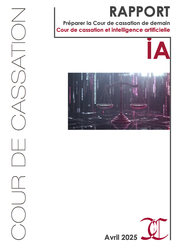
► Référence complète : Cour de cassation, Préparer la Cour de cassation de demain. Cour de cassation et intelligence artificielle, rapport, avr. 2025, 159 p.
____
________

March 29, 2025
Publications

🌐follow Marie-Anne Frison-Roche sur LinkedIn
🌐subscribe to the Newsletter MAFR Regulation, Compliance, Law
🌐subscribe to the Video Newsletter MAFR Surplomb
____
 ► Full Reference: M.-A. Frison-Roche, The Contract, a Compliance tool: the Obligation for a platform to control content CE, 27 January 2025, B. c/ CNIL, Working Paper, March 2025.
► Full Reference: M.-A. Frison-Roche, The Contract, a Compliance tool: the Obligation for a platform to control content CE, 27 January 2025, B. c/ CNIL, Working Paper, March 2025.
____
🎤 This Working Paper was developed as a basis for the Overhang👁 video on 29 March 2025 : click HERE (in French)
____
🎬🎬🎬In the collection of the Overhangs👁 It falls into the News category.
►Watch the complete collection of the Overhangs👁 : click HERE
____
► Summary of this Working Paper: The ruling handed down on 15 January 2025 by the Commercial, Economic and Financial Chamber of the French Judicial Supreme Court (Cour de cassation) provides a solution to the issue of content control in the digital environment. It resolves what appears to be the aporia so often emphasised, and even claimed, namely the impossibility of developing an effective controlling technology.
To do this, the Court disregarded the applicable laws and referred to the electronic payment contract between the bank and the platform, which contained a clause on Vigilance against unlawful content, linked to a termination clause. It held that this clause was fully effective. This solution, so simple and so strong, can make a major contribution to regulating the digital space, if the banks so wish, because what platform can do without reliable electronic payment services?
____
🔓read the developments below⤵️

Feb. 21, 2025
Organization of scientific events
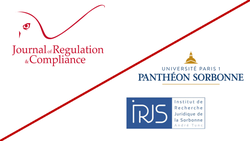
🌐follow Marie-Anne Frison-Roche on LinkedIn
🌐subscribe to the Newsletter MAFR. Regulation, Compliance, Law
🌐subscribe to the Newsletter Surplomb, par MAFR
____
► Full Reference: M.-A. Frison-Roche & G. Loiseau (dir.), Durabilité de l'Internet : le rôle des opérateurs du système des noms de domaine. Compliance et régulation de l'espace numérique (Sustainability of the Internet: the role of the operators of the domain name system. Compliance and regulation of the digital space), Journal of Regulation & Compliance (JoRC) and Institut de Recherche Juridique de la Sorbonne (André Tunc - IRJS), Paris 1 Panthéon-Sorbonne University, 21 Fabruary 2025
____
► General presentation of this symposium: The digital space has been built on and as a system. Its primary interest is of a negative nature: it consists of to be preserved against the prospect of systemic failure, of not collapsing. Like all other systems, this 'Monumental Goal' specific to the digital system justifies resources that incorporate this concern for the future. As with all systems, it integrates and relies on the specific technical nature of this system.
The digital space is largely based on the invention, technology and architecture of domain names. Domain names, as an addressing system, enable users to enter the digital space and find other Internet users. The uniqueness and solidity of the domain name system, entrusted to a single root and decentralisation, makes this community possible for those who use the digital space and ensures the technical durability required, without which the digital space would be compromised.
The architecture, operation, operators and what they do under the control of legislators, regulators, judges and legal subjects are therefore examined from a dual technical and legal perspective, in the light of the imperative of sustainability.
This allows to progress in 4 stages.
Firstly, to examine the permanence in time and space of the domain name system, insofar as it is the foundation of the Internet and the digital system. This technical construction gives rise to legal qualifications, not only for the present but also for the future, since the Web3 offers new technical solutions.
Secondly, this technical sustainability is an imperative that is built into the operators of the domain names themselves, which are inter-linked not only at national level but also at global level, this cross-linking being necessary for the security of the system. The State is present through public law techniques that enable surveillance, control and possible recovery.
Thirdly, it imposes constraints on the operators subject to them in order to serve this monumental goal of technical sustainability, and these constraints themselves generate as many powers as they need to usefully achieve this mission. This proportionality must be at the heart of the method and the requirements. The relationship between constraints and powers also stems from it.
Fourthly, this imperative of technical sustainability, which is global in nature, gives way to imperatives of societal sustainability, more localised in space and time, when domain name operators are called upon by the legitimate authors of binding standards, legislators in the first instance, to express concerns such as the protection of people involved in the digital space and whose rights are compromised or who are in danger.
This second type of sustainability, which is more localised and less inherent in the architecture of the Internet, is justified by the available power of the operators concerned and their adherence to social imperatives. The resulting constraints and powers are therefore not the same.
The 2 sustainabilities must then be articulated in a conception that is both teleological and pragmatic.
____
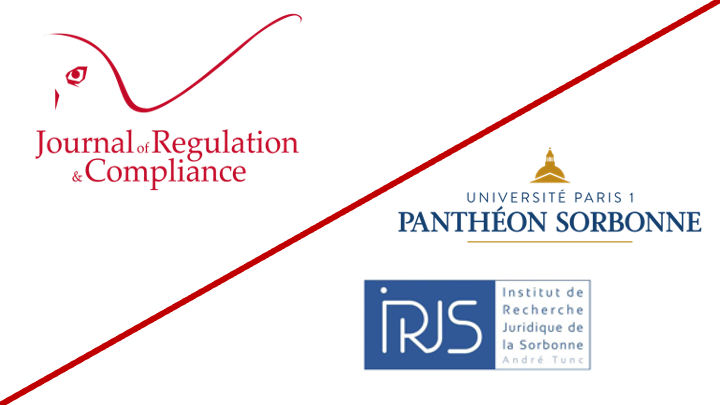
____
► Speakers (they will speak in French, but the book to be published will be in English):
🎤Pierre Bonis, Chief Executive Officer of the Association française pour le nommage Internet en coopération (Afnic)
🎤Lucien Castex, Adviser of the Afnic Chief Executive Officer for Research internet and society and Internet governance
🎤Marie-Anne Frison-Roche, Full Professor of Regulatory and Compliance Law, Director of the Journal of Regulation & Compliance (JoRC)
🎤Claire Leveneur, Senior Lecturer at Paris-Est Créteil University
🎤Grégoire Loiseau, Full Professor at Paris 1 Panthéon-Sorbonne University
🎤Samir Merabet, Full Professor at the University of West Indies
🎤Antoine Oumedjkane, Senior Lecturer at Lille University
🎤Frédéric Sardain, attorney at law, Jeantet law firm
____
read below a detailed presentation of this event⤵️
Feb. 21, 2025
Conferences

🌐suivre Marie-Anne Frison-Roche sur LinkedIn
🌐s'abonner à la Newsletter MAFR Regulation, Compliance, Law
🌐s'abonner à la Newsletter en vidéo MAFR Surplomb
____
 ► Full Reference: M.-A. Frison-Roche, "La clé de la proportionnalité pour établir l’équilibre des obligations, pouvoirs et droits - Exemple de l’inclusion technique assurée par les opérateurs des noms de domaine" (The key to proportionality in balancing obligations, powers and rights - Example of technical inclusion by domain name operators), in M.-A. Frison-Roche et G. Loiseau (dir.), Durabilité de l'Internet : le rôle des opérateurs du système des noms de domaine (Sustainability of the Internet: the role of the operators of the domain name system. Compliance and regulation of the digital space). Compliance et régulation de l'espace numérique, 21 février 2025, organisé par le Journal of Regulation & Compliance et l'Institut de la Recherche en Droit de la Sorbonne (André Tunc - IRDJS), 12 place du Panthéon, Paris.
► Full Reference: M.-A. Frison-Roche, "La clé de la proportionnalité pour établir l’équilibre des obligations, pouvoirs et droits - Exemple de l’inclusion technique assurée par les opérateurs des noms de domaine" (The key to proportionality in balancing obligations, powers and rights - Example of technical inclusion by domain name operators), in M.-A. Frison-Roche et G. Loiseau (dir.), Durabilité de l'Internet : le rôle des opérateurs du système des noms de domaine (Sustainability of the Internet: the role of the operators of the domain name system. Compliance and regulation of the digital space). Compliance et régulation de l'espace numérique, 21 février 2025, organisé par le Journal of Regulation & Compliance et l'Institut de la Recherche en Droit de la Sorbonne (André Tunc - IRDJS), 12 place du Panthéon, Paris.
____
🧮see the full programme of this colloquium (in French)
____
► Summary of this conference: The domain name operators operate in a liberal system and have internalised the tasks being technically inherent in the very architecture of the Internet, while the Public Authorities, because they recognise this nature, ensure in Ex Ante that there are no global failures.
This translates into a system of obligations. All the more so since domain name operators not only bear multiple obligations but also, by order of the laws and regulations, impose them on others, for example on their co-contractors and users.
It is from this perspective that the Principle of Proportionality, which is central here, must be considered. It is another expression of the legal Principle of Necessity, which must be conceived in terms of goals: what is proportionate is what is necessary to achieve the objective with regard to which the duties and prerogatives are entrusted and/or exercised. This is why it is first necessary to recall and explain what the Principle of Proportionality is with regard to the operators obligations covered by Compliance Law, which goes beyond jurisdictional powers such as sanctions or dispute resolution, to explain the teleological control of obligations and powers (I).
From this practical framework, the most relevant example is the technical obligation of inclusion (II) In the technical sense, Inclusion means that anyone who wants to enter the digital space must be able to do so and must be able to reach those who are there and be reached by others. This gives everyone the right to reach and be reached.
Is it possible to go further and ask for comfort for everyone and equality in this comfort and advantages to rebalance this accessibility? For instance, to know everything about everyone beyond this simple digital adresse? To ask domains names operators to help everyone to develop his/her personality in the digital space, compensating his/her lack of initial chance? This is social and political inclusion. It is not the same thing. It does not have the same sources. It does not follow the same paths. Not the same forces. The Sustainability that is then projected can be cumulative. A distinction has to be made on the one hand, and a link made on the other. Moreover, in the name of mistreated social inclusion, can we mistreat technical inclusion, i.e. exclude a person from the digital space? (III).
________
Jan. 15, 2025
Thesaurus : 02. Cour de cassation

► Référence complète : Com., 15 janvier 2025, n° 23-14.625, Société Générale c/société Dstorage.
____
____
🚧lire le document de travail qui en fait l'analyse
____

Updated: Dec. 31, 2024 (Initial publication: Jan. 1, 2024)
Organization of scientific events
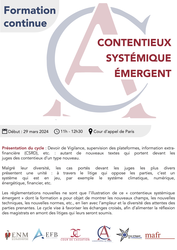
► Full Reference: M.-A. Frison-Roche, Coordination of the cycle of conference-debates Contentieux Systémique Émergent (Emerging Systemic Litigation), organised on the initiative of the Cour d'appel de Paris (Paris Cour of Appeal), with the Cour de cassation (French Court of cassation), the Cour d'appel de Versailles (Versailles Court of Appeal), the École nationale de la magistrature - ENM (French National School for the Judiciary) and the École de formation des barreaux du ressort de la Cour d'appel de Paris - EFB (Paris Bar School), under the scientific direction of Marie-Anne Frison-Roche
____
► This Cycle in few words: Duty of vigilance, supervision of platforms, non-financial information (CSRD), etc.: as many new texts that bring new types of disputes before the courts.
Despite their diversity, the cases brought before the most diverse judges present a unity: through the dispute that pits the parties against each other, it is a system that is at stake, for example the climate system, digital system, energy system, financial system, etc.
New regulations are just the illustration of this "Emerging Systemic Litigation"; the conference-debates aiming at showing the new fields, new techniques, new standards, etc., in relation to the scale and diversity of stakeholders' expectations. This cycle is designed to encourage cross-fertilisation, so as to provide judges with food for thought ahead of the litigation they will be called upon to deal with.
Les réglementations nouvelles ne sont que l’illustration de ce « contentieux systémique émergent » dont la formation a pour objet de montrer les nouveaux champs, les nouvelles techniques, les nouvelles normes, etc., en lien avec l’ampleur et la diversité des attentes des parties prenantes. Le cycle vise à favoriser les échanges croisés, afin d’alimenter la réflexion des magistrats en amont des litiges qui leurs seront soumis.
____
🔴Registrations and information requests can be sent to: inscriptionscse@gmail.com
🔴For the attorneys, registrations have to be sent to the following address: https://evenium.events/cycle-de-conferences-contentieux-systemique-emergent/
⚠️The conference-debates are held in person only, in the Cour d’appel de Paris (Paris Court of Appeal).
____
► General Presentation of the Cycle: In 2024, the Cour d’appel de Paris (Paris Court of Appeal) created a new specialised chamber: chamber 5-12 Contentieux émergent – Devoir de vigilance et responsabilité écologique (Emerging litigation - Duty of vigilance and environmental liability). Vigilance litigation is an example of what is emerging more generally: Systemic Litigation, often linked to technologies. This calls for a new way of judging, organising procedures and relations between professionals. A series of conference-debates on Emerging Systemic Litigation (ESL) is being organised jointly by the Paris Court of Appeal, the Versailles Court of Appeal, the Cour de cassation (French Court of cassation), the École nationale de la magistrature - ENM (French National School for the Judiciary) and the École de formation des barreaux du ressort de la Cour d'appel de Paris - EFB (Paris Bar School), under the scientific responsibility of Professor Marie-Anne Frison-Roche.
In this context, a series of conference-debates involving professionals from a wide range of backgrounds is being proposed on the following themes:
- 🧮the very notion of "Emerging Systemic Litigation" and the role of the judiciary in it (29 March 2024): read the report of this event
- 🧮vigilance, insofar as it gives rise to Systemic Litigation, notably because it takes legal form in numerous contracts, for example in employment relationships (26 April 2024): read the report of this event
- 🧮the inclusion in Emerging Systemic Litigation of information reliability techniques, particularly with regard to content available on platforms (27 May 2024): read the report of this event
- 🧮the way in which artificial intelligence is generating Systemic Litigation and the influence of new specific texts (24 June 2024): read the report of this event
- 🧮sustainability, a principle of systems found in reports and transitively in disputes concerning their development, their standards and even their control (9 September 2024): read the programme of this event
- 🧮new evidentiary techniques required by Emerging Systemic Litigation, to account for systemic needs, e.g. climate and digital systems, and how firms respond to them (14 October 2024): read the programme of this event
- 🧮Vigilance General Procedural Law, in that it incorporates the Systemic dimension of Vigilance Litigation (18 November 2024): read the programme of this event
- 🧮institutional and case law feedback from courts on Emerging Systemic Litigation (16 December 2024): read the programme of this event
____
🧮read below the full programme of this cycle of conference-debates⤵️

Dec. 6, 2024
MAFR TV : MAFR TV - Overhang

🌐suivre Marie-Anne Frison-Roche sur LinkedIn
🌐s'abonner à la Newsletter MAFR. Regulation, Compliance, Law
🌐s'abonner à la Newsletter Surplomb, par MAFR
____
► Référence complète : M.-A. Frison-Roche, "Régulation et Compliance", in série de vidéos Surplomb, 6 décembre 2024
____
🌐visionner sur LinkedIn cette vidéo de la série Surplomb
____
____
🎬visionner ci-dessous cette vidéo de la série Surplomb⤵️
____
Surplomp, par mafr
la série de vidéos dédiée à la Régulation, la Compliance et la Vigilance
